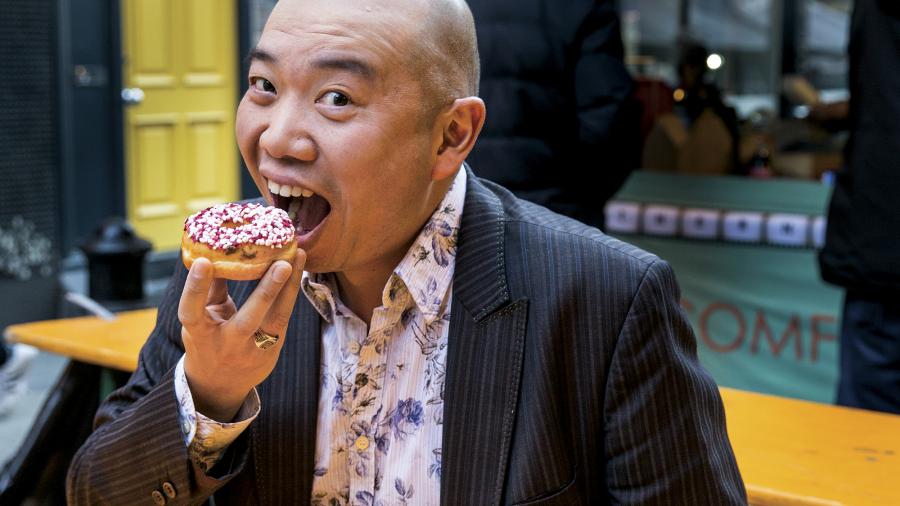How to rebuild a city with Karam Alkatlabe


“The calories that you get on the side of a packet,” says Wolfson Fellow and Tutor, Dr Giles Yeo, “are based on a set of factors published in 1900. 1900! That’s a hundred and twenty-one years ago!”

In his new book, Why Calories Don’t Count: How We Got the Science of Weight Loss Wrong, Dr Yeo takes up the baton to modernise how we look at calories, with significant implications for our diets and, ultimately, our health.
According to Dr Yeo, when the American chemist Wilbur Atwater first measured the calories contained in foods in 1900 – “painstakingly feeding humans and then burning their poop” using a bomb calorimeter – he did not take into account a crucial factor: caloric availability, specifically the heat given off during metabolism.
“Your body has to work harder or less hard in order to extract calories depending on the type of food that you eat,” says Dr Yeo. “Proteins are broken down into their building blocks: amino acids; starch is broken down into glucose; and fat is broken down into fatty acids and they go into the blood. Your body then needs to take those apart and convert them into energy. And it takes energy to do that. Atwater never took into account the energy required to break them down.”
Basic calorie counting is therefore flawed from the outset, simply because comparing different foods with different caloric availabilities will never stack up.
“For every one hundred calories of protein that you eat,” says Dr Yeo, “and it doesn’t matter whether it comes from a bean or it comes from a steak, you’re only ever able to absorb 70 calories; 30 calories is the cost of doing business and it tends to be lost as heat. Fat is very dense, it’s very efficient, very little heat is given off when you digest it, it’s nearly a hundred per cent available. Carbs are about 90 – 95 per cent available, depending on whether we’re talking about complex carbs or sugar. So every calorie count you see everywhere is wrong, in terms of what we actually absorb.”
In short, it’s not the calories that count, it’s where the calories come from. And this concept of caloric availability also offers a new avenue to explore eating more healthily too.
“The two biggest elements of food that influence caloric availability are (a) protein content, and (b) fibre content. So if you have foods that are higher in protein or higher in fibre, you in effect reduce the caloric availability of the food. It just so happens that if you have food that is higher in protein content and high in fibre, it tends to be a good marker of quality.
“So if you take ultra-processed foods for example, they tend to be lower in protein and fibre, depending on the type of ultra-processed food we're eating. They also lack flavour, so you have to replace flavour; and flavour comes from three things: sugar, salt, and fat. And this is why ultra-processed foods are not so great for us. Inherently, they are low in protein and fibre, increasing their caloric availability. So 400 calories of ultra-processed food is going to be far, far closer to 400 calories in the body than 400 calories of something else that was not ultra-processed.”
Even within the world of ultra-processed foods, there are better choices to be made, however. Choosing a 240-calorie chocolate bar high in fibre and protein – one that includes dried fruits and nuts, for example – is a better choice than a 240-calorie bar that is low in protein and fibre.
“What I want people to understand is that understanding the concept of caloric availability is a good way of trying to improve the quality of the diet we're eating. I think if we have a better look at how calorically available a given food, it also is a good proxy for the quality of the food that you're actually eating. And I think that is the more important point.”
Why Calories Don’t Count follows Dr Yeo’s 2019 publication. Gene Eating: The Story of Human Appetite, a data-driven debunking of diet fads, which focused on physiology in order to illuminate how we can make better decisions around the food we eat and better tackle the obesity problem.
“And if I was PM for the day,” says Dr Yeo, discussing the wider problem of obesity and public health, “what would I do in order to help people make healthy choices? Well, first of all, I would remove weight stigma, but leaving that aside, I would subsidise healthy food, like fruits and vegetables, because that makes the ability to choose healthily, to eat healthily more equitable; then you remove the pound amount from the issue. And then we’re on our way to at least fixing the obesity issue and certainly the diet related and other diet related illnesses.”
In the meantime, Dr Yeo’s new book is important contributor to the improving public dialogue on the science of healthy eating.
You can order 'Why Calories Don't Count: How we got the science of weight loss wrong' on the Orion Books website.







